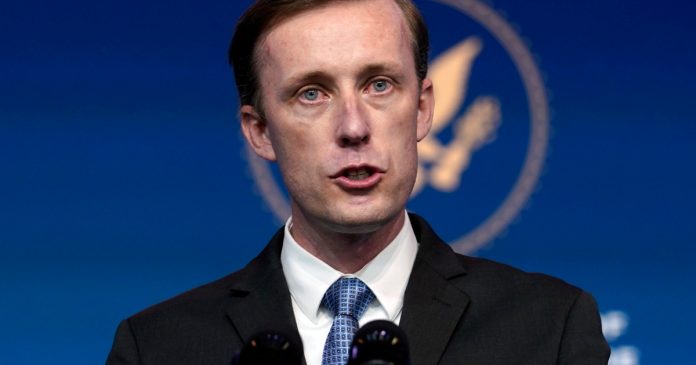[ad_1]
US President Joe Biden’s national security adviser, Jake Sullivan, says dealing with China, Afghanistan and Iran are key early priorities for the new administration.
“From our perspective, a critical early priority has to be to deal with what is an escalating nuclear crisis as they (Iran) move closer and closer to having enough fissile material for a weapon,” Sullivan told an online programme sponsored by the US Institute of Peace on Friday.
“We would like to make sure that we establish some of the parameters and constraints around the program that have fallen away over the course of the past few years,” Sullivan continued.
Sullivan’s comments come after Biden’s new secretary of state, Tony Blinken, on Wednesday insisted Tehran must resume complying with the 2015 Iran nuclear deal before Washington would do so.
Blinken said “that if Iran comes back into full compliance with its obligations under the JCPOA, the United States would do the same thing”.
Tehran will not accept the US’s demands that it reverse acceleration of its nuclear programme before Washington lifts sanctions, Foreign Minister Mohammad Javad Zarif said on Friday.
The demand “is not practical and will not happen”, he said at a joint news conference in Istanbul with his Turkish counterpart, Mevlut Cavusoglu.
Iran breached the terms of the accord in a step-by-step response to the decision by Biden’s predecessor, Donald Trump, to abandon the deal in 2018 and reimpose sanctions on Tehran.
Earlier this month, Iran resumed enriching uranium to 20 percent at its underground Fordow nuclear plant – a level it achieved before the accord.
However, Iran has said it can quickly reverse those violations if US sanctions are lifted.
“If the United States fulfils its obligations, we will fulfil our obligations in full,” he said.
‘Hard look’ at Taliban agreement
Sullivan discussed the May 1 deadline to withdraw the remaining US forces in Afghanistan under the deal, stating they are “taking a hard look” at how the Taliban is complying with its agreement with the US before deciding how to proceed.
The February 2020 agreement with the Taliban calls for a complete US troop withdrawal by May 2021 in return for the group fulfilling security guarantees.
The agreement, Sullivan pointed out, has three conditions that “stand out” to the Biden administration: The Taliban’s cutting of ties with “terrorist” groups, their “meaningful” reduction of violence and support of ceasefires, and their participation in “real … not fake” negotiations with the Afghan government.
“What we’re doing right now, is taking a hard look at the extent to which the Taliban are in fact complying with those three conditions, and in that context, we make decisions about our force posture and our diplomatic strategy going forward,” Sullivan said.
His comments come one day after the Pentagon said “it is very hard” to see a “way forward” with the agreement without the Taliban meeting its commitments.
“Without them meeting their commitments to renounce terrorism and to stop the violent attacks on the Afghan National Security Forces … it is very hard to see a specific way forward for the negotiated settlement, but we’re still committed to that,” Pentagon spokesman John Kirby told reporters on Thursday.
US officials and diplomats have said ties between the Taliban, especially its Haqqani Network branch, and al-Qaeda remain close.
“Thus far, the Taliban has been, to put it politely, reticent to meet their requirements,” Kirby added.
Meanwhile, the Taliban on Friday accused the US of violating its side of the agreement with a spokesman saying “almost every day they are violating it”.
“They are bombarding civilians, houses and villages, and we have informed them from time to time, these are not just violations of the agreement but violations of human rights,” Mohammad Naeem, a Taliban spokesman in Qatar, told the AFP news agency on Friday.
China also key
Sullivan also said on Friday the United States must be prepared to impose costs on China for its actions against Uighur Muslims in Xinjiang, its crackdown in Hong Kong and threats towards Taiwan.
He said the US needs to speak with clarity and consistency and needs to be “prepared to act, as well to impose costs, for what China is doing in Xinjiang, what it is doing in Hong Kong, for the bellicosity and threats it is projecting towards Taiwan”.
Sullivan did not elaborate on specific steps Washington might take.
He said the China issue was at the top of those to be addressed between the US and allies in Europe and stressed the need to agree on joint responses with Europe on China’s trade and technology abuses.
“We don’t have entirely aligned perspectives on every one of these issues … I think China is right at the top of the list of things that we’ve got to work together on and where there is work to do to get fully aligned.”
The Biden administration, which took office on January 20, has indicated it will continue the tough approach to China pursued by Trump but wants Beijing’s cooperation on policy priorities such as climate change.
Blinken has endorsed a last-minute determination by his predecessor, Mike Pompeo, that China has committed genocide in Xinjiang. The move increases pressure for more US sanctions, which the Trump administration also imposed over Beijing’s crackdown on democracy in Hong Kong.
Biden’s administration issued a strong statement in support of Taiwan amid stepped-up Chinese military activity near the island, stressing the US commitment to Taipei is “rock solid”.
[ad_2]
Source link











